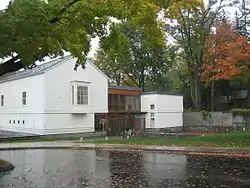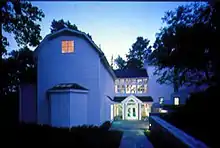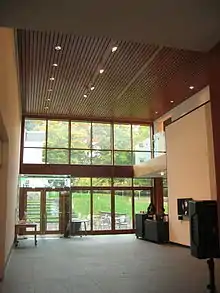The Aldrich Contemporary Art Museum
The Aldrich Contemporary Art Museum is located in Ridgefield, Connecticut. The Aldrich has no permanent collection and is the only museum in Connecticut that is dedicated solely to the exhibition of contemporary art.[1] The museum presents the first solo museum exhibitions by emerging artists, significant exhibitions of established and mid-career artists whose work is under recognized, thematic group exhibitions exploring topics in contemporary art and society, and newly commissioned work.
 | |
 Location within Connecticut  The Aldrich Contemporary Art Museum (the United States) | |
| Established | November 1964 |
|---|---|
| Location | 258 Main Street, Ridgefield, Connecticut, United States |
| Type | Art museum |
| Website | www |
History

The Aldrich was founded in 1964 by Larry Aldrich (1906–2001) with the purpose of being one of the first truly contemporary art museums in the United States. Using money he raised from selling his own art collection (which included works by Picasso, Miró, Chagall, Paul Klee, and others), Mr. Aldrich bought an 18th-century former church and general store known as "Old Hundred" and converted it into the Larry Aldrich Museum.[2]
The museum was originally located in the historic "Old Hundred" building on Main Street in Ridgefield, Connecticut, constructed in 1783 by Joshua King and James Dole, two lieutenants in the Revolutionary War. During its history the building has served as a grocery and hardware store, a residence, a church, and now houses The Aldrich's administrative offices.
The museum, whose original board of trustees included Alfred Barr, Joseph Hirshhorn, Philip Johnson, and Vera List, was renamed The Aldrich Museum of Contemporary Art in 1967. To better focus on its founding mission to exhibit only the very newest art, the museum's board voted in 1981 to deaccession the museum's permanent collection.[2]
Mr. Aldrich stayed active and involved with the museum until his death in 2001, shortly prior to which The Aldrich's board of trustees, with their chairman emeritus in attendance, had voted to proceed with a major renovation and expansion. Groundbreaking took place in April 2003, and the galleries reopened to the public in June 2004 with a new name, The Aldrich Contemporary Art Museum. The new building was designed by architect Charles Mark Hay, design principal at Tappé Associates, Boston, and is based on an abstraction of traditional New England architecture. The facility received a design award from the American Institute of Architects (AIA).[3]
In June of 2022, Amy Smith-Steward was named the chief curator of the museum, becoming the first woman to hold this position since its founding.[4]
Exhibitions
The Aldrich Museum features works by national and international emerging and mid-career artists. Larry Aldrich said in a 1986 interview: "Almost all the well-known American artists you can think of have been seen here at early stages of their careers. Among them Jasper Johns, Robert Rauschenberg, Frank Stella, and Cy Twombly."[2] Additional notable names include: Eva Hesse, Ann Hamilton, Robert Smithson, Jack Whitten, Olafur Eliasson, Huma Bhabha, KAWS, Mark Dion, and Shazia Sikander.[5]
Recent notable exhibitions include Material Witness, Five Decades of Art by Harmony Hammond (2019); The Domestic Plane: New Perspectives on Tabletop Art Objects (2018); A Roll in the Way by Kate Gilmore (2014); Six Story Gathering Boxes by Mary Beth Edelson (2014); Underscore by Xaviera Simmons (2013); the first solo museum exhibition of KAWS (2010); 50,000 Beds: A Project by Chris Doyle (2007); Velimir Chlebnikov by Anselm Kiefer (2006); No Reservations: Native American History and Culture in Contemporary Art (2007); Cameras by Tom Sachs (2009); Under the Westside Highway by Rackstraw Downes (2010);[6] Navigator by Karla Knight (2021-22).[7]
Education

In 1993, former director Harry Philbrick, while director of education, started The Aldrich Museum’s currently discontinued Student Docent Program. Student Docents from local schools were trained to lead their classmates through the galleries while discussing contemporary art and concepts like structure, content, form, symbolism, abstraction and metaphor. Students also got to see the installation process of the exhibitions on view and meet the artists. In an interview with The New York Times Philbrick said: "It begins to get them to think critically about the process—making the work of art and hanging an exhibition. They know there's a real live human being who makes these things, and can relate what they learn to a work of art." The program was adopted by museums across the United States.[8]
Directors
- Dorothy Mayhall
- Carlus and Ruth Dyer[9]
- Robert Metzger
- Ellen O'Donnell Rankin
- Barry Rosenberg
- Jill Snyder[10]
- Harry Philbrick
- Alyson Baker
- Cybele Maylone
Notable board members
References
- "The Aldrich Contemporary Art Museum Website".
- Russell, John (October 30, 2001). "Larry Aldrich, Who Founded Art Museum, Dies at 95". The New York Times. Retrieved September 13, 2016.
- "About Harry Philbrick".
- "Amy Smith-Stewart Named Chief Curator of Aldrich Contemporary Art Museum". www.artforum.com. Retrieved 2022-06-17.
- "Exhibitions". The Aldrich Contemporary Art Museum. Retrieved 2019-03-08.
- The Aldrich Contemporary Art Museum.
- Rosenberg, Karen (5 January 2022). "For Karla Knight, Paranormal is Normal". The New York Times. Retrieved 30 December 2022.
- Zimmerman, Andrea (May 19, 1996). "The View From: Ridgefield; Contemporary Art Demystified". The New York Times.
- "Ruth Dyer, sculptor, museum official" Archived 2012-07-26 at archive.today Acorn, Obituaries from The Ridgefield Press. Retrieved November 7, 2011.
- William Zimmer, "In Stamford, a Decorous Annual", The New York Times (April 14, 1996). Retrieved November 7, 2011.